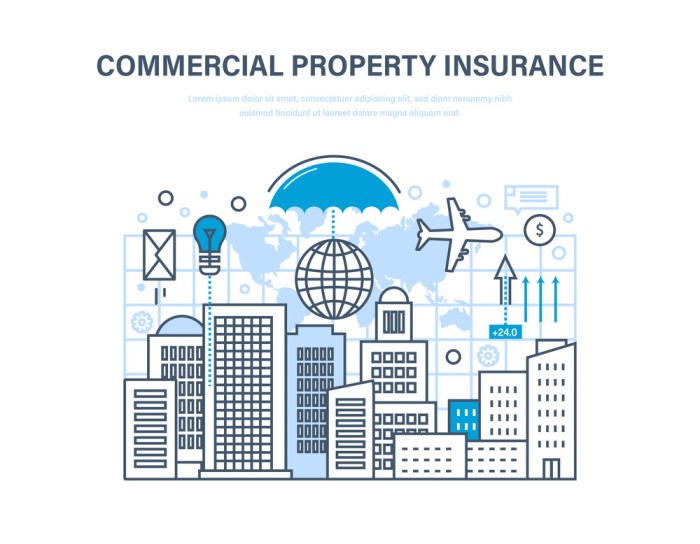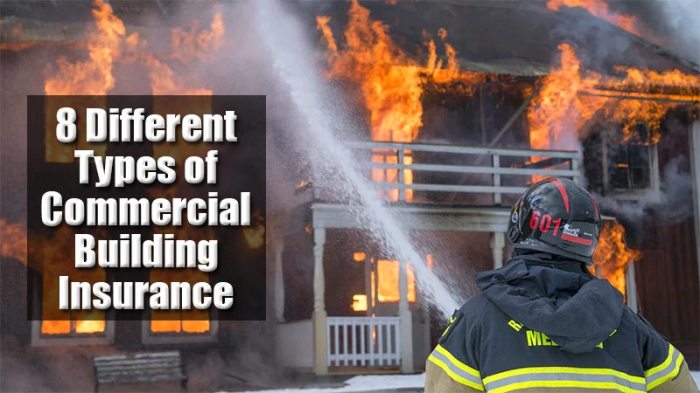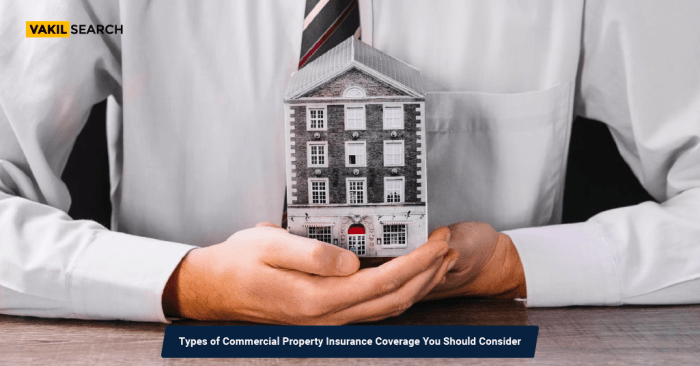Commercial property insurance sets the stage for this enthralling narrative, offering readers a glimpse into a story that is rich in detail and brimming with originality from the outset. It’s not just about bricks and mortar; it’s about safeguarding the heart of your business – your assets.
Imagine this: your storefront, bustling with customers, is suddenly engulfed in flames. Or perhaps a powerful storm ravages your warehouse, leaving your inventory in ruins. These are just a few scenarios where commercial property insurance can be your lifeline. It’s a safety net that protects your business from unexpected events, ensuring you can bounce back and keep your operations running smoothly.
What is Commercial Property Insurance?

Commercial property insurance is a vital protection for businesses that own or lease buildings, structures, and their contents. It safeguards your business against financial losses arising from various unforeseen events, ensuring business continuity and minimizing disruptions.
Covered Risks, Commercial property insurance
Commercial property insurance offers comprehensive protection against a wide range of risks that can threaten your business.
- Fire: This coverage protects your property against damage caused by fire, including the cost of extinguishing the fire and any resulting smoke or water damage.
- Theft: Commercial property insurance covers losses due to theft or burglary, including stolen inventory, equipment, and other valuable assets.
- Vandalism: Vandalism and malicious mischief can cause significant damage to your property. This coverage helps you repair or replace damaged property and recover lost income.
- Natural Disasters: Natural disasters, such as hurricanes, earthquakes, floods, and tornadoes, can cause extensive damage to your property. This coverage helps you rebuild or repair your property and recover lost business income.
- Liability: Commercial property insurance also covers liability claims arising from accidents or injuries that occur on your property. This coverage protects you from lawsuits and legal expenses.
Types of Commercial Properties
Commercial property insurance is essential for a wide range of businesses, including:
- Retail Stores: Retail stores are particularly vulnerable to theft, vandalism, and natural disasters. Commercial property insurance provides essential protection for their inventory, fixtures, and equipment.
- Restaurants: Restaurants face risks like fire, water damage, and food spoilage. This insurance helps them recover from these events and continue operating.
- Offices: Offices are susceptible to theft, vandalism, and natural disasters. This insurance protects their equipment, furniture, and records.
- Warehouses: Warehouses store valuable inventory and equipment, making them vulnerable to fire, theft, and natural disasters. Commercial property insurance provides crucial protection for these assets.
- Manufacturing Facilities: Manufacturing facilities face risks like fire, explosions, and equipment breakdowns. This insurance safeguards their machinery, raw materials, and finished goods.
Types of Coverage
Commercial property insurance offers a range of coverage options to protect businesses from various risks. Understanding the different types of coverage available is crucial for ensuring comprehensive protection and minimizing financial losses in the event of an unexpected incident.
Building Coverage
Building coverage protects the physical structure of your business, including the walls, roof, foundation, and any permanent fixtures. This coverage typically includes protection against damage caused by fire, windstorms, hail, vandalism, and other perils. For example, if a fire damages your building, building coverage would help pay for repairs or reconstruction.
Business Personal Property Coverage
Business personal property coverage protects the contents of your business, such as furniture, equipment, inventory, and supplies. This coverage extends to items both inside and outside your building, including items in transit. If a theft occurs and your business equipment is stolen, this coverage would help replace the stolen items.
Loss of Income Coverage
Loss of income coverage, also known as business interruption insurance, helps businesses recover lost income if they are forced to shut down due to a covered event. This coverage pays for expenses such as payroll, rent, and utilities during the period of business interruption.
For example, if a power outage forces your business to close temporarily, loss of income coverage would help cover your ongoing expenses while you are unable to operate.
Factors Affecting Premiums

Your commercial property insurance premium is calculated based on several factors that assess the risk of insuring your property. Understanding these factors can help you make informed decisions to potentially lower your premiums.
Protecting your commercial property is like safeguarding your financial future. Just as you invest in Whole life insurance to ensure your family’s security, commercial property insurance provides a safety net against unexpected disasters, ensuring your business can bounce back from a fire, flood, or other unforeseen events.
It’s all about peace of mind, knowing your investment is protected and your business can weather any storm.
Property Value
The value of your property is a primary determinant of your premium. The higher the value of your property, the higher your premium will be. This is because insurers have a greater financial exposure if your property is damaged or destroyed.
For example, a large office building will have a higher premium than a small retail store, all other factors being equal.
Location
The location of your property can significantly impact your premium. Properties located in areas prone to natural disasters, such as earthquakes, hurricanes, or floods, will have higher premiums. This is because insurers face a higher risk of claims in these areas.
For instance, a property located on a coastal area with a high risk of hurricanes will likely have a higher premium than a property located in a more inland area.
Industry
The industry your business operates in can also affect your premium. Certain industries are considered higher risk than others. For example, a manufacturing plant with hazardous materials will have a higher premium than a retail store. This is because the risk of fire, explosion, or other accidents is higher in hazardous industries.
Risk Factors
Various risk factors can influence your premium, including:
- Building construction:Properties built with fire-resistant materials, such as concrete or brick, will generally have lower premiums than properties built with wood.
- Security measures:Properties with security systems, such as alarms, surveillance cameras, and fire suppression systems, will often have lower premiums.
- Claims history:A history of previous claims can lead to higher premiums. Insurers may view businesses with frequent claims as higher risk.
- Business operations:The type of business operations can affect premiums. For example, a business that handles flammable materials will have a higher premium than a business that does not.
- Employee safety record:Businesses with a strong safety record and low incident rates may receive lower premiums.
Policy Exclusions and Limitations

Commercial property insurance policies, like any insurance contract, have specific exclusions and limitations. These are designed to protect the insurance company from covering risks that are considered too difficult or expensive to insure. Understanding these exclusions and limitations is crucial for businesses to ensure they have adequate coverage and avoid unexpected financial losses.
Common Exclusions and Limitations
Exclusions and limitations are designed to prevent the insurer from assuming excessive risk. They also ensure fair and reasonable premiums for all policyholders.
- Acts of War: Coverage for losses caused by war, invasion, or acts of foreign enemies is typically excluded. This is due to the unpredictable and widespread nature of such events, making it difficult to assess and manage the risk.
- Nuclear Hazards: Losses caused by nuclear weapons or radioactive materials are usually excluded. The potential for widespread and catastrophic damage makes this a high-risk category.
- Earthquakes: While earthquake coverage is sometimes available as an add-on, it is often excluded in standard commercial property policies. This is because earthquakes are unpredictable and can cause significant damage, leading to high insurance costs.
- Flooding: Similar to earthquakes, flood coverage is usually excluded in standard policies. This is because flooding is a common occurrence, particularly in certain geographic areas, and can result in extensive damage.
- Government Action: Coverage for losses caused by government actions, such as condemnation or seizure of property, is often excluded. This is due to the unpredictable nature of government decisions and the potential for legal challenges.
- Wear and Tear: Damage caused by normal wear and tear or gradual deterioration of property is typically excluded. This is because these are expected occurrences and not considered insurable events.
- Neglect: Losses resulting from the insured’s negligence or failure to maintain the property are often excluded. This encourages policyholders to take reasonable care of their property.
Examples of Coverage Denial
It’s essential to understand how exclusions and limitations can impact coverage in specific situations. Here are some examples:
- Scenario 1: A business owner fails to maintain the roof of their commercial building, leading to leaks and damage during a heavy rainstorm. The insurance company may deny coverage for the damage, citing the exclusion for neglect.
- Scenario 2: A manufacturing facility experiences a fire caused by an employee’s deliberate act of arson. The insurance company may deny coverage for the fire loss due to the exclusion for intentional acts.
- Scenario 3: A retail store suffers damage from a flood caused by a nearby river overflowing its banks. The insurance company may deny coverage for the flood damage if flood coverage was not included in the policy.
Claim Process
Filing a claim under your commercial property insurance policy is a crucial step in recovering from a covered loss. The process is designed to ensure fairness and transparency while helping you navigate the complexities of insurance claims. This section Artikels the steps involved in filing a claim, the documentation required, and tips for maximizing your chances of a successful outcome.
Documentation and Information Required
Providing the necessary documentation and information is vital for a smooth and efficient claim process. It helps your insurance company assess the extent of the damage and determine the appropriate compensation.
- Policy Information:Your policy number, coverage details, and contact information for your insurance agent or broker are essential for initiating the claim process.
- Incident Report:A detailed report outlining the date, time, and circumstances of the loss is crucial. Include information about the nature of the damage, any witnesses, and any relevant details about the incident.
- Proof of Ownership:Provide evidence of your ownership or lease agreement for the property to establish your right to file a claim.
- Inventory of Damaged Property:A comprehensive list of all damaged property, including descriptions, quantities, and estimated values, is essential for accurate assessment and compensation.
- Repair Estimates:Obtain estimates from qualified contractors for repairs or replacement of damaged property to support your claim.
- Supporting Documentation:Depending on the nature of the loss, you may need to provide additional documentation, such as police reports, weather reports, or medical records.
Tips for Navigating the Claim Process
- Act Promptly:Report the loss to your insurance company as soon as possible to ensure timely processing of your claim.
- Document Everything:Keep detailed records of all communication, including dates, times, and the names of individuals involved in the claim process. Take photographs and videos of the damage, if possible.
- Be Honest and Accurate:Providing false or misleading information can jeopardize your claim. Be transparent and provide accurate details about the incident and the damaged property.
- Cooperate with the Adjuster:Be responsive to requests for information and schedule inspections with the insurance adjuster promptly.
- Understand Your Policy:Review your policy carefully to understand your coverage limits, deductibles, and any exclusions that may apply to your claim.
- Consider Legal Counsel:If you encounter difficulties with the claim process or have concerns about the insurer’s handling of your claim, consider consulting with an attorney experienced in insurance law.
Importance of Adequate Coverage
Inadequate commercial property insurance coverage can have serious financial consequences for businesses. The right level of coverage is essential to protect your assets and ensure your business can recover from unexpected events.
Working with an Insurance Agent
It’s crucial to work with a knowledgeable insurance agent to determine the appropriate coverage levels for your specific needs. An agent can help you:
- Assess your property’s value and determine the amount of coverage you need.
- Identify potential risks specific to your business and industry.
- Explain different types of coverage and their benefits.
- Help you choose the right policy and coverage limits.
Examples of Inadequate Coverage
Inadequate coverage can lead to significant financial losses in various situations, such as:
- Natural Disasters:A business with insufficient coverage for flood or earthquake damage may face substantial financial losses if a natural disaster occurs.
- Fire:A fire that causes extensive damage to a building or inventory can result in significant financial losses if the business is underinsured.
- Theft:A business that is underinsured for theft may not be able to fully recover the value of stolen inventory or equipment.
- Business Interruption:If a business is forced to shut down due to a covered event, inadequate business interruption coverage can lead to lost revenue and profits.
Commercial Property Insurance vs. Homeowners Insurance
Understanding the differences between commercial property insurance and homeowners insurance is crucial for businesses and individuals alike. Both types of insurance protect against various risks, but they cater to distinct needs and cover different types of properties. This section will delve into the key distinctions between these two types of insurance, highlighting the specific coverage they provide and the properties they protect.
Types of Properties Covered
Commercial property insurance and homeowners insurance differ significantly in the types of properties they cover. Homeowners insurance is designed to protect residential properties, including single-family homes, condominiums, townhouses, and duplexes. This insurance covers the structure of the dwelling, personal belongings, and liability for accidents occurring on the property.
On the other hand, commercial property insurance protects businesses and their assets, including buildings, inventory, equipment, and other property used in the operation of the business. This insurance covers a wide range of commercial properties, such as office buildings, retail stores, warehouses, factories, and restaurants.
Coverage Differences
The coverage provided by commercial property insurance and homeowners insurance differs substantially. Homeowners insurance typically includes the following coverages:
- Dwelling Coverage:Protects the physical structure of the home against damage from covered perils, such as fire, windstorms, hail, and vandalism.
- Personal Property Coverage:Covers personal belongings inside the home, including furniture, electronics, clothing, and jewelry, against loss or damage.
- Liability Coverage:Provides financial protection if someone is injured on the property or if the homeowner is held liable for property damage caused to others.
- Additional Living Expenses Coverage:Covers temporary living expenses if the home becomes uninhabitable due to a covered event, such as a fire or natural disaster.
Commercial property insurance, on the other hand, offers a broader range of coverage options tailored to the specific needs of businesses. Some common coverages include:
- Building Coverage:Protects the physical structure of the business property, including the building itself, attached structures, and permanent fixtures.
- Business Personal Property Coverage:Covers the contents of the business property, such as inventory, equipment, furniture, and supplies.
- Business Income Coverage:Provides financial protection for lost income if the business is forced to close due to a covered event.
- Liability Coverage:Protects the business against claims of negligence or injury to third parties.
- Extra Expense Coverage:Covers additional expenses incurred to restore business operations after a covered event.
Why Commercial Property Insurance is Essential for Businesses
Businesses, even those that own their property, require commercial property insurance for several reasons:
- Protection Against Financial Losses:A covered event, such as a fire or natural disaster, can cause significant financial losses to a business. Commercial property insurance helps businesses recover from these losses by covering the cost of repairs or replacements.
- Business Continuity:Business income coverage helps businesses continue operating during a shutdown caused by a covered event, minimizing disruptions to their operations.
- Legal Protection:Liability coverage protects businesses from lawsuits stemming from injuries or property damage caused to third parties.
- Meeting Contractual Obligations:Some leases or loan agreements may require businesses to maintain commercial property insurance.
- Peace of Mind:Commercial property insurance provides businesses with peace of mind, knowing they are financially protected against unexpected events.
Final Summary
In the unpredictable world of business, commercial property insurance is your trusted companion, offering peace of mind and financial security. By understanding the nuances of coverage, exclusions, and the claim process, you can navigate the world of insurance with confidence.
So, arm yourself with knowledge and ensure your business is protected from the unexpected.
Key Questions Answered
What types of businesses need commercial property insurance?
Pretty much any business that owns or leases property needs this coverage. From small retail stores to large manufacturing facilities, commercial property insurance is essential for safeguarding your assets.
How much coverage do I need?
The amount of coverage you need depends on several factors, including the value of your property, the nature of your business, and your risk tolerance. It’s best to consult with an insurance agent to determine the right level of coverage for your specific needs.
What are some common exclusions in commercial property insurance policies?
Common exclusions include damage caused by wear and tear, acts of war, and certain types of natural disasters. It’s crucial to carefully review your policy to understand what’s covered and what’s not.
How do I file a claim?
Contact your insurance agent or company immediately after an incident. They will guide you through the claim process and provide you with the necessary forms and instructions.